Al-Burhan Targets Hamdok with Death Penalty to Foil Ceasefire Efforts
In light of recent actions by the authorities to list the organization as extremist, this step aims to prevent any attempt by regional and international forces to make Hamdok a key player in any upcoming transitional stage in Sudan

Sudan’s general prosecutor, under army leader Abdel Fattah al-Burhan, on Wednesday brought charges punishable by death against former Prime Minister Abdallah Hamdok, who was overthrown by the army in 2021, for advocating negotiations to end the war in Sudan. This move marks an escalation against civilian forces advocating for an end to fighting in the country and coordinating with regional and international forces to achieve that goal.
Sudan’s official television said the general prosecutor had “registered a complaint” against the former prime minister and fifteen others, including party leaders and journalists, accusing them of “undermining the constitution and waging war against the state”, charges punishable by death for which arrest warrants and extradition have been issued.
The announcement of the Coordination of Civil Democratic Forces, known as “Tajdeed,” in October last year by several parties, professional sectors, and some armed movements aimed to end the war and prevent a humanitarian crisis in the country.
Hamdok, Sudan’s first civilian prime minister after the fall of the military-Islamic regime led by Omar al-Bashir for thirty years in 2019, has been in exile since the coup led by al-Burhan against his government in collaboration with his former deputy and current adversary, Rapid Support Forces leader General Mohamed Hamdan Dagalo. All those accused outside Sudan also reside abroad.
For several months, Hamdok has been in contact with Sudanese, regional, and international parties, including the United States, to end the war in Sudan through negotiations, raising concerns for al-Burhan and Islamic forces allied with him as well as leaders from the former regime.
In these efforts, Hamdok reached an agreement with Dagalo to begin negotiations to end the conflict that erupted in April 2023 between the army and the Rapid Support Forces, resulting in tens of thousands of deaths, forcing millions to flee, and pushing a poverty-stricken state to the brink of famine.
This move by al-Burhan‘s camp against Hamdok comes after U.S. Special Envoy to Sudan Tom Perriello announced at the end of last month his hope for the resumption of dialogue between Sudan’s conflicting parties after Ramadan and working to prevent a wider regional war, despite the failure of previous negotiations.
Many observers believe this move aims to prevent any attempt by regional and international forces to make civilian forces, especially Tajdeed and its leader Hamdok, key players in any upcominal-Bashir g transitional stage in Sudan. This move also indicates that the former regime of Omar is back and seeking revenge against civilian forces that contributed to its downfall through popular movements.
Previous rounds of talks in Jeddah, Saudi Arabia, resulted only in general commitments to end the conflict in Sudan, which was going through a difficult transition to democracy. Nevertheless, regional and international efforts continue to stabilize Sudan, where Egyptian Assistant Foreign Minister Hossam Issa discussed with American officials efforts to halt hostilities in Sudan and the possibility of opening humanitarian corridors to deliver aid to those affected.
This occurred during a meeting between Issa and Perriello, as well as U.S. Ambassador to Egypt Hera Mustafa, in Cairo, according to a statement from the Egyptian Ministry of Foreign Affairs published Wednesday on its Facebook page.
The ministry said the meeting discussed “efforts to achieve a ceasefire in Sudan, return to the negotiating table, preserve the blood of the Sudanese people, and ensure the safety of civilians.” It also discussed the possibility of opening humanitarian corridors to facilitate the delivery of food and medical supplies to Sudanese, highlighting the central role of Egypt and neighboring countries in this regard. Both parties agreed to continue consultations and coordination in the next stage and to provide all possible support to help Sudan overcome its difficult phase, according to the same source.












